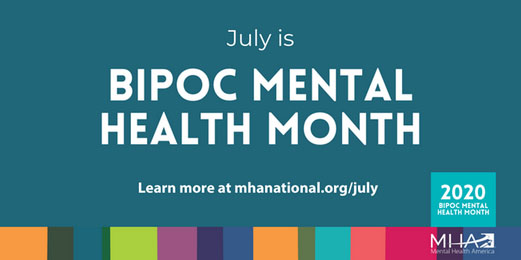July is BIPOC (Black, Indigenous, and People of Color) Mental Health Month which serves to bring awareness to the unique challenges that marginalized groups face when it comes to their mental health. BIPOC are often faced with years, even generations, of trauma and systemic racism. Combined with a mistrust of professionals and other cultural barriers, this can lead to increased mental illnesses and lack of services for these groups. We must also consider how multiple identities such as race/ethnicity, gender, sexual orientation, and socioeconomic status (to name a few) impact the mental health of different communities.
To learn more about BIPOC Mental Health or download the toolkit, visit this website.
- Kit includes definitions, infographics, and language to use to educate/promote topics
Although not an exhaustive list, you can visit these websites for more information and resources:
- Racial Trauma/Race-Based Traumatic Stress
- Health Care Disparities Among BIPOC
- BIPOC Communities and COVID-19
- Black/African American Mental Health
- Latinx/Hispanic Mental Health
- Asian, Pacific Islander, and Desi American Mental Health
- Native and Indigenous Mental Health
- LGBTQIA+ Mental Health
- Mental Health Screenings
By Gustavo Molinar, Mental Health Literacy Specialist


